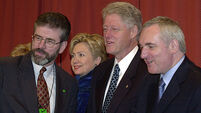State Papers: Omagh aftermath, stolen Prussian jewels and Haughey's otter exemption

Pictures: Eamonn Farrell/RollingNews.ie, U.S. National Archives, Paul McErlane/PA Archive
Thursday saw the publication of dozens of documents contained within the 'State Papers' — a tranche of memos, minutes, and secret letters written by politicians and top civil servants during their tenures.
The records from the Department of the Taoiseach, the Department of Foreign Affairs, and the Office of the Attorney General, have been released via the National Archives.













